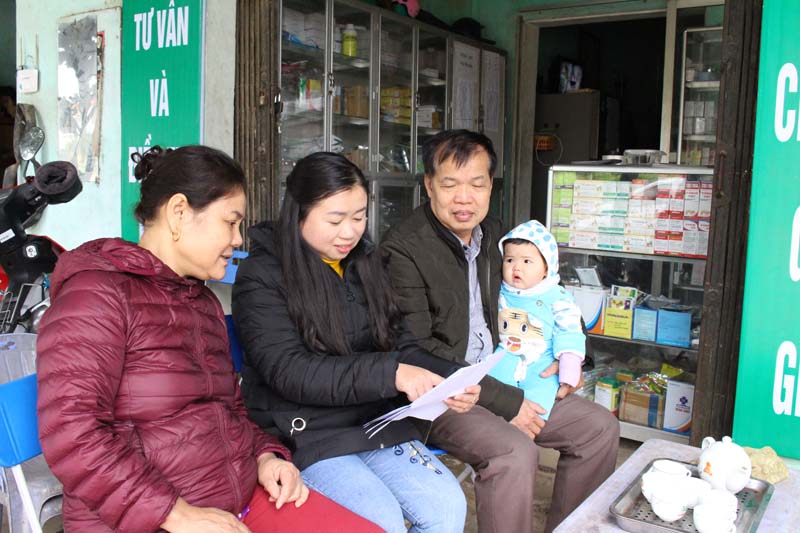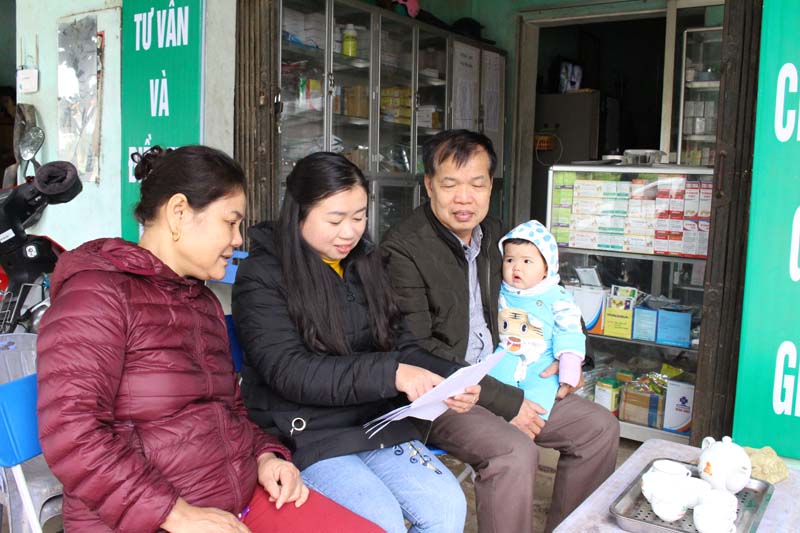
(HBO) – Building civilised families is among the tasks of a campaign entitled "All people join hands to build civilised lives”. The implementation of the task has been strengthened in Phong Phu commune (Tan Lac district) over the recent years and, as a result, 86.9 percent of the households received the title of civilised families in 2018.

Cultural staff of Phong Phu commune (Tan Lac district)
disseminate criteria of civilised families to local people.
Since the launch of the
campaign "All people join hands to build civilised lives”, the Party Committee
and the People’s Committee of the commune formed a steering board and devised
its regulations. The campaign has been disseminated to all local residents.
Each year, the local
households are informed of the assessment for civilised families in an open,
fair, and rule-based manner.
The steering board is expected
to answer people’s expectation and promptly address difficulties during the
campaign.
The building of civilised
families has proved effective in enhancing power of the national unity in the socio-economic
development. Notably, the movement on hunger eradication and poverty reduction
recorded high efficiency, with the rate of poor households brought down to 5.6
percent in 2018.
With the due attention of
the Party Committee and authorities in the steering and communication work
towards the building of civilised families, in the 2016-2018 period, Phong Phu
commune saw 770 households winning the title for three consecutive years. Of
the number, 55 families were honoured with prizes and eight out of the nine
residential areas recognised as civilised villages.
The development of the
civilised families building has given a facelift to Phong Phu commune’s rural
areas, and material and spiritual lives of the local people were improved. The
annual per capita income in the commune hit 34.2 million VND. Local people
comply with guideline, policies and regulations of the Party and State, while
cultural traits of Muong ethnic minority were conserved and bolstered in the modern
context./.
With an increasingly vibrant and widespread emulation movement aimed at building cultured residential areas and cultured families, Yen Thuy District has been making steady progress toward improving both the material and spiritual well-being of its people, while fostering a civilized, prosperous, beautiful, and progressive community.
Once lacking recreational spaces and community facilities, Residential Group 2 in Quynh Lam Ward (Hoa Binh City) has recently received attention for the construction of a new, spacious, and fully equipped cultural house. The project followed the model of state support combined with public contributions in both labor and funding.
The "All people unite to build cultural life" movement, which has been effectively integrated with Kim Boi district’s socio-economic development goals, is fostering a lively spirit of emulation across local residential areas, hamlets, villages, public agencies, and enterprises. In addition, through the initiative, traditional cultural values are being preserved and promoted, while community solidarity and mutual support in poverty reduction and economic development are being strengthened.
A working delegation of the Hoa Binh provincial People’s Committee led by its Permanent Vice Chairman Nguyen Van Toan on June 11 inspected the progress of a project to build the Mo Muong Cultural Heritage Conservation Space linked to tourism services in Hop Phong commune, Cao Phong district.
Born and growing in the heroic land of Muong Dong, Dinh Thi Kieu Dung, a resident in Bo town of Kim Boi district, in her childhood was nurtured by the sweet lullabies of her grandmother and mother. These melodies deeply imprinted on her soul, becoming an inseparable part of her love for her ethnic group's culture. For over 20 years, this love for her hometown has driven Dung to research, collect, and pass down the cultural values of the Muong people to future generations.
In the final days of May, the Ethnic Art Troupe of Hoa Binh Province organized performances to serve the people in remote, mountainous, and particularly disadvantaged areas within the province. These were not just ordinary artistic shows, but they were the meaningful journeys aimed at spreading cultural values, enhancing the spiritual life of the people and contributing to the preservation of ethnic minority cultural identities.



